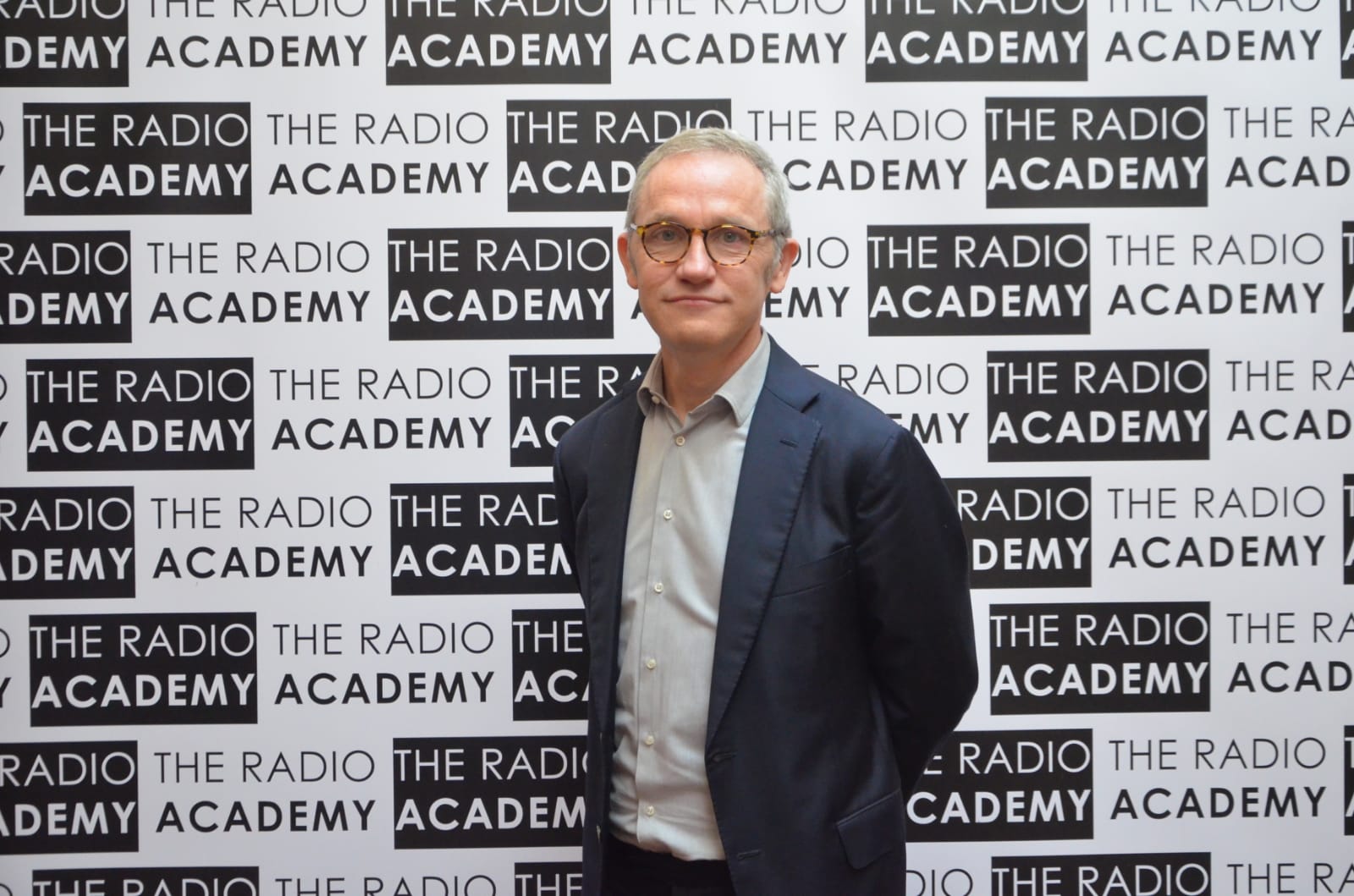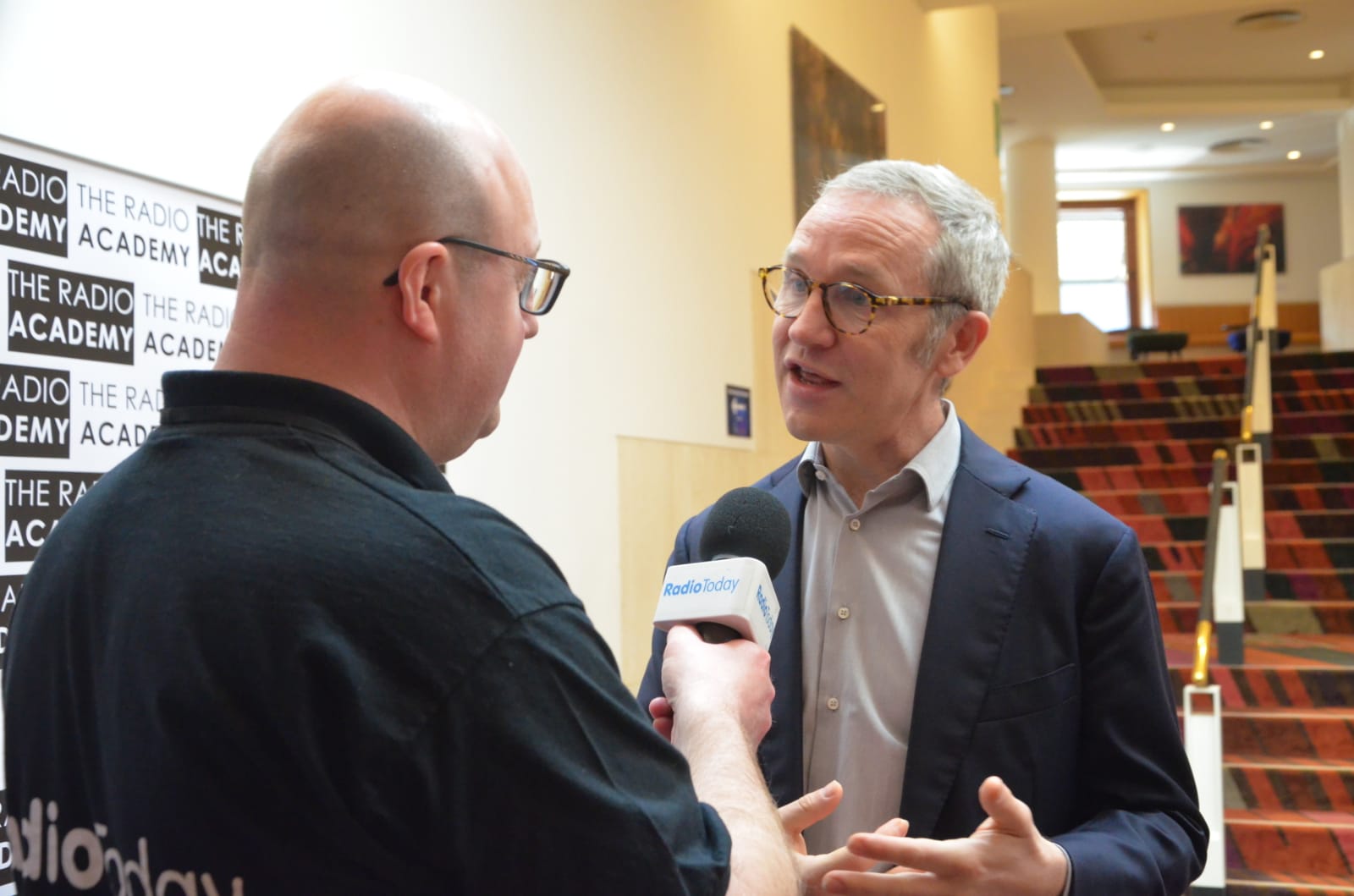
James Purnell, BBC’s Director of Radio and Education, has spoken at the Radio Festival about a new public service algorithm to improve BBC Sounds.
The Director says the BBC wants to make sure it is recommending radio programmes, podcasts and music to listeners not just based on what they already enjoy but also in a way that meets our public service values.
A team in the BBC’s Design and Engineering division is already working on the tools and components that will make up what is being called ‘a public service algorithm’. There won’t be a sudden change or introduction of a single development but the BBC will continue to tailor its online products and services to give people not just what they want from the BBC – but also help them discover content which they think will also enhance their lives. The work will continually be developed and improved as it learns how best to recommend audio that users will want to listen to which also meets the BBC’s public service mission.
Hear more from James and other special guests at the Radio Festival 2019 in this week’s RadioToday Programme Podcast, out Wednesday.
His speech, titled “Changing to stay the same” is published below in full:
Six months ago, we launched BBC Sounds.
Today, rather than talk about radio generally, I want to talk specifically about Sounds.
Today, I want to explain why I believe Sounds is so important; why it has a critical role to play in the
success of British radio; and why it matters so much to me.
The last of which starts longer ago than I would care to admit in suburban Paris, in the 1970s, where I grew up. You couldn’t get British products in Paris then: we had to bring crumpets and marmite back on the ferry from Newhaven to Dieppe.
But we could listen to Radio 4 on longwave in our kitchen.
So the weekends were the one time each week that I was surrounded by English voices.
While ‘Sport on 4’ with Tony Lewis drew me in, the serendipity of radio’s linear programme meant I then
found ‘Breakaway’ and ‘From Our Own Correspondent’ too.
In those formative years, BBC radio helped me understand that country over the water that was home.
By the 1980s, I had returned home.
In my bedroom in Guildford, Steve Wright and Simon Bates on Radio 1 introduced me – for better or
worse – to 80s pop.
It was Radio 1 again in the 90s, through Mark & Lard and Jo & Steve, that I discovered the soundtrack to
my life: Britpop, Lauryn Hill, Massive Attack.
As for so many others, BBC radio played a huge part in shaping me.
It’s what radio does.
A little world that we lose ourselves to but find ourselves within. And one that is fundamental to the
fabric of our society. I was lucky enough to join the BBC in the 1990s, hired off the back of an interview on the Today programme.
I helped defend Radio 1 from privatisation, and worked on regulation that still stands to this day. I wrote the BBC’s digital strategy which saw the biggest increase in the licence fee in a generation.
And throughout, including my time in politics, radio was a passion: even playing my own small part in defending 6 Music from the BBC itself in 2010 – though that was more as a fan than a politician.
For three years after politics, I worked on the creative end: pitching and producing programmes.
This included producing ‘One Mile Away’, the first documentary to win the top award at the Edinburgh International Film Festival, and also a film which, much more importantly, brokered a truce between rival gangs in Birmingham.
The director, Penny Woolcock, and I were planning to start our own indie when I received a call from Tony Hall.
The BBC was at a moment of great challenge and Tony asked me to come back and help.
So sixteen years after I left, I returned.
But before I did, I took a break, and travelled around South America. A little late in the day for a gap year, perhaps. But in the process I discovered podcasts, working my way through the archive of ‘In Our Time’, ‘Desert Island Discs’ and ‘This American Life’.
Returning to the BBC, another Charter Review loomed.
But I was also pursued by that memory of South America: how audio was changing, the wonderful potential of that change, but how the BBC had to embrace it.
Creativity
Thanks to all of you, radio has so far avoided the disruption that has visited other media. Commercial radio is on a strong footing, now worth over £700m per year.
But the long-term trends are not as positive.
We’ve lost 10% of listening hours in the last 10 years.
Apple and Spotify already have over 60% of the podcast and music streaming market in the UK. Our role, the role of everyone in this room, is not just to serve today’s listeners, but to prepare the service for tomorrow.
At the BBC, we know we won’t be as big as we were without the American giants. But we do have to serve everyone, with programmes and products they love. We can have a smaller share, but we can be as special to audiences and important to society.
But I want to be clear: the decision to launch Sounds was not a cold question of market share. What I discovered in that trip around South America was the creative freedom of podcasts. The freedom to target any audience, with any kind of content.
Take Forest 404, made by our enterprising team in Bristol, and – as far as we can see – the first drama to
make it to the top of the iTunes podcast chart. It’s part fiction, part lectures, part soundscapes, and
combines to produce something thrilling and important.
The reaction on social media was amazing. Someone called Vicki Cornock was typical – “I’m not normally
a fan of podcasts or audio drama but Forest 404 is something else. Two episodes in and I am hooked.”
Which is great, because we’ve got so much more radio drama, the best in the world, to recommend to her.
And that’s where Sounds comes in.
Opportunity
Linear radio is one of civilisation’s great inventions.
I’m often asked if I think linear radio will still be here in ten or twenty years’ time. My answer is that I don’t know what to predict – but I do know what I want to happen. I want our stations to prosper because they are so good, and because they are such important public spaces.
But audiences are increasingly consuming on mobile phones, on-demand. We designed Sounds to serve
those new habits.
BBC Sounds complements our stations. It opens up new creative possibilities and it creates new opportunities to listen.
That most certainly does not mean sacrificing quality, or ‘dumbing down’. To consider younger audiences less intelligent is both insulting and untrue. The cult phenomenon of the “never knowingly relevant” ‘In Our Time’ stands testament to this, as does the success of recent series like Radio 4’s ‘The Ratline’ or 5Live’s ‘End of Days’.
It may mean some surprises, some content that is not for everyone, but to me this only shows how little variety there once was in spoken content on the BBC. Besides, if the tastes of the younger generation do not offend the sensibilities of their elders, something would seem pretty amiss to me.
Serendipity
On demand and linear achieve the same purposes in different ways.
Take serendipity: the experience of a linear schedule that allows listeners to stumble on something new, entirely unrelated to what they initially tuned in to. Algorithms could threaten this: by recommending more of the same, they can limit the breadth of a listener’s experience.
This matters to me.
The serendipity of radio was, after all, what allowed me to move from ‘Sport on 4’ to ‘From Our Own Correspondent’. It’s surely the only reason I became a politician and not a footballer. But algorithms can be positive.
They learn from what you don’t like and stop recommending you the wrong things. And they can surface things similar to what you are listening to that you would not otherwise have found.
But there is reason to be nervous about embracing algorithms in the way that streaming platforms do. The BBC rests on three foundations: to entertain, yes, but also to inform and educate. Most algorithms do the former, but not the latter.
That’s why we are developing our own: a public service algorithm.
This is not an algorithm that just gives you more of the same, but an algorithm built to surprise you, to direct your attention to new information, to different points of view, to pop your bubble. Algorithms are made in the image of their designers and can be biased against people who are different.
But when they are designed with a public service purpose, they do not have to be biased and they do not have to create echo chambers – they can open them up.
Opportunity
This ultimately is the promise of Sounds: not to replace radio, but to find ways to bring the same experience to new audiences who will not find it at a radio-set.
When we launched Sounds, we knew that we were taking on the biggest businesses in the world, and that we were going to market late.
We also know that the best way to launch a product is to test and learn from what does and doesn’t work – then respond to feedback and change.
I am glad to say that the response has been positive: with 1.3m weekly users, and 84% of app users saying that they would recommend Sounds to a friend.
But as with any product, you launch, find ways to improve, and learn. The app, for instance, is built for personalisation, but is not yet fully personalised. This means that right now a user sees programmes that have not been curated for them. That is changing, as of this month in fact. By the autumn, Sounds will be highly personalised. Sounds has not gone to market the complete, finished product.
As an institution, it has required a shift in mindset for us all: from never putting out an unfinished programme, to never waiting until a product is ‘finished’ before you release it. But that shift is essential because a product can only improve once you know how your users respond to it.
And so as Sounds develops, it will continuously improve.
It’s already good, offering more types of audio than Apple, Spotify or anyone else. It can already take us on incredible journeys, as I experienced last weekend, following its recommendations from Start the Week, to the Verb to the Cheltenham Jazz Festival, jumping across time and stations in ways that would previously have seemed like magic.
But this is just the start – what will be the radio equivalent of binge watching? Where will these creative possibilities take us? That’s the prize of Sounds and it will help linear radio just as much as podcasts.
Industry
Sounds is good. It’s going to be great.
It will help BBC Radio.
But we also want to see if it can play a wider role.
The global platforms have improved consumer choice and democratised content creation. But they are commercial spaces, run from other countries.
Audiences deserve a choice – with a public sphere in the media, not just a commercial one. And our creative industries deserve support – with distribution platforms that favour British content creators.
So we want to open BBC Sounds up to podcasts made outside of the BBC.
And we are in discussions about opening the app to commercial radio too. We’ve seen this play out in other industries. The incumbents failed to collaborate, which allowed the new entrants to aggregate their content and walk off with the audience. We mustn’t repeat that mistake in audio.
Conclusion
Sounds is new, but its purpose is as old as the BBC itself. We created it because we want radio to endure, but to do so it must also evolve. Our brilliant departing Radio 4 controller, Gwyneth Williams, was interviewed on ‘Feedback’ recently. She quoted a line from Tomasi di Lampedusa’s ‘The Leopard’, which she had broadcast on Radio 4 on New Year’s Day.
“In order for everything to remain the same, everything has to change.”
Thanks to all of you, in the last twenty years, there’s been a huge amount of change. Unlike many other media, commercial radio is growing. And the BBC remains the biggest media provider for young people in the UK.
But that’s only because we’ve always been brave enough to embrace change when we have needed to. And that’s what we’ll do with Sounds and our radio stations all over again. It’s why we want to open Sounds up to benefit the whole industry.
And it’s why I’m convinced that Sounds can do for today’s audiences what Radio 4 did for me in the 1970s, making us curious, giving us a reason to sit still and listen, discover who we are, what we believe, and who we will become.
Changing for things to stay the same.
Posted on Monday, May 13th, 2019 at 11:52 am by Roy Martin



